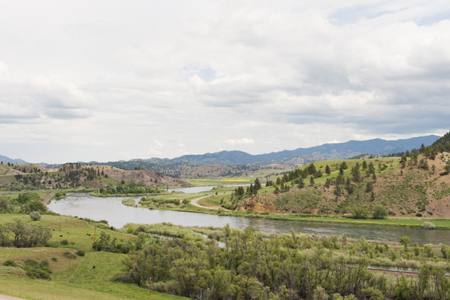Slippery Road Ahead for Midwest Farms Impacted by Flooding
Category: Grains, Miscellaneous
 Flood waters recently raged through the Missouri River basin (including parts of Missouri, Montana, North Dakota, South Dakota, Kansas, Nebraska and Iowa), taking a tremendous toll on agriculture and food prices throughout the rest of this year, and quite possibly into 2012 as well. Spanning a nine-state region, the floods had an almost instantaneous effect on food prices and transport across the United States.
Flood waters recently raged through the Missouri River basin (including parts of Missouri, Montana, North Dakota, South Dakota, Kansas, Nebraska and Iowa), taking a tremendous toll on agriculture and food prices throughout the rest of this year, and quite possibly into 2012 as well. Spanning a nine-state region, the floods had an almost instantaneous effect on food prices and transport across the United States.
Protective levees, dikes and dams were breached due to the sheer volume of water caused by historic flooding from snow packs in the upper Northern Rocky Mountains and excessive rain in the early part of spring.
“The conflict with the Missouri River basin is the sheer flooding and magnitude of the number of acres that will be out of production because they have been under water for four to five weeks,” states Stephen S. Nicholson, Chief Economist at International Food Products in St. Louis. “Because of this, the land won’t be productive this year, or possibly the next year.”
Wet and flooded fields delayed planting for many farmers—many of them struggling to get crops in the ground during the single week break in weather. In fact, average losses for farmers are hovering around $1,000 an acre, says Dave Miller, director of Research and Commodity Services for the Iowa Farm Bureau.
“While a 150,000-acre loss in Iowa would have a minimal impact in the big picture, the USDA just came out with a supply and demand report last week which estimates a loss of 2 million harvestable acres in the last month because of continued wet weather in the Dakotas and Ohio plus flooding in the Mississippi River basin and approaching floods in the Missouri River area. That is likely to frenzy the corn market, and we may see the highest prices yet for corn,” Miller added.
The U.S. agriculture market experienced similar devastation in 2008 when torrential flooding overwhelmed much of the Midwest. However, this year’s flooding remains more alarming because it’s across two river basins and four crucial farming states.
Additionally, the flooding caused logistical problems for soybean oil plants along the river, including Bunge in Council Bluff, Missouri, and AGP Co-Op in St. Joseph, Missouri. Flooding also led to problems for rail and truck shipments. For example, the Union Pacific Railroad and Burlington Northern Railroad have experienced delays in their ability to swiftly export soybeans, oil and meal.
The Army Corps of Engineers spent time putting up temporary dikes as a preventative measure. Unfortunately, the Corps took the top soil off the neighboring farms to produce the levees and other protective structures, possibly putting those farms out of commission forever.




